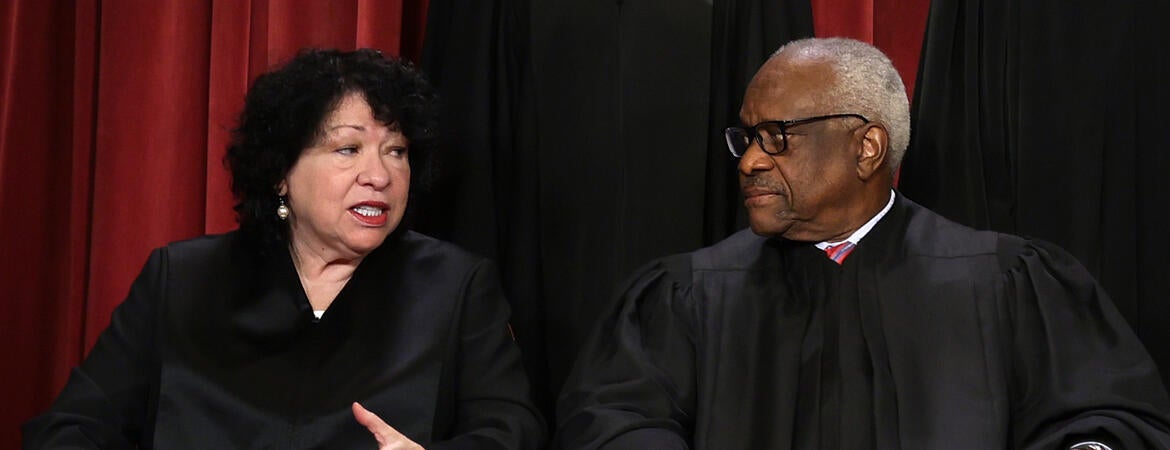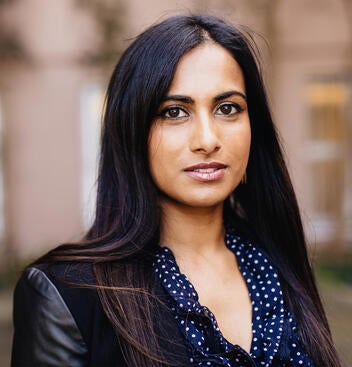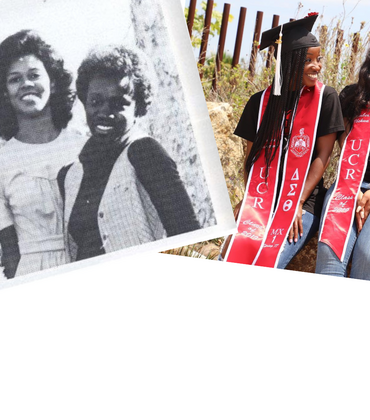
When a conservative majority of the U.S. Supreme Court in June struck down race-conscious admissions at our nation’s colleges and universities, it was a blow of particular significance to UC Riverside education Associate Professor Uma Jayakumar.
Jayakumar had served as an expert witness for students of color intervenors at the University of North Carolina, or UNC, at Chapel Hill in 2021 when the affirmative action case was heard by a lower court. And last year, Jayakumar and Bill Kidder, a UCR ethics and compliance professional, organized an amicus brief submitted to the Supreme Court in support of race-conscious admissions at UNC that was signed by 1,241 social scientists.
Yet when news broke this summer of the 6-3 decision that effectively ended affirmative action in college admissions, something unexpected happened. Jayakumar received multiple texts and emails from friends and colleagues telling her that Justice Sonia Sotomayor cited Jayakumar’s research in a strongly worded dissent.
“I was focused on the heartbreak and the damage control,” said Jayakumar of UCR’s School of Education. “I hadn’t yet dove into the dissenting opinions. That’s where lies the hope and the truth in this court case, and even the instructions for legal strategies and movements to be launched ahead.”
While not binding, dissenting opinion can distill and package the losing side’s arguments for easy reference should the issue return to the high court under future circumstances with different judges.
In her dissent, Sotomayor cited Jayakumar by name for a paper the professor published in 2015 as a National Academy of Education/Spencer Postdoctoral Fellow, before she joined UCR. Jayakumar’s paper probed the isolation many students of color face on campuses after their admission.
Sotomayor used Jayakumar’s findings to counter Justice Clarence Thomas’s argument that university affirmative action policies foster what he described as another kind of racial segregation, because campuses allow for formations of Black student unions and other “affinity groups” that strive to improve the success of students of color through comradery and shared experiences.
“I remember, as a grad student, when Justice Thomas had misappropriated my mentor (UCLA distinguished professor) Walter Allen’s foundational work on the importance of Black-centered educational environments, to make this same point Thomas was once again pushing,” Jayakumar said.
“Sotomayor in a way enabled us to set the record straight.”
In a separate opinion that concurred with the majority, Thomas wrote:
“It has become clear that sorting by race does not stop at the admissions office. In his (2003) Grutter opinion, Justice (Antonin) Scalia criticized universities for ‘talk[ing] of multiculturalism and racial diversity,’ but supporting ‘tribalism and racial segregation on their campuses,’ including through ‘minority only student organizations, separate minority housing opportunities, separate minority student centers, even separate minority-only graduation ceremonies.’ . . . This trend has hardly abated with time, and today, such programs are commonplace.”
Sotomayor staunchly disagreed with Thomas.
“Not only is there no evidence of a causal connection between the use of race in college admissions and the supposed rise of those activities, but Justice Thomas points to no evidence that affinity groups cause any harm,” she wrote in her dissent.
Sotomayor then cited Jayakumar’s paper published by the Education Research Institute at UCLA in 2015 to explain that “affinity-based activities,” such as Black student groups, are both beneficial and needed.
Such groups “ ‘actually help racial minorities improve their visibility on college campuses’ and ‘decrease racial stigma and vulnerability to stereotypes’ caused by ‘conditions of racial isolation’ and ‘tokenization,’ ” Sotomayor wrote, quoting phrases from Jayakumar’s paper
Jayakumar’s paper starts with a summary of the body of social science research about students of color (also called minority students) that followed the 1997 publication of “Why are all the Black kids sitting together in the cafeteria?” a landmark book on race by scholar and psychologist Beverly Tatum, the former president of the historical Black women’s Spelman College, in Atlanta, Ga. She also was once a student of Jayakumar’s mentor Walter Allen.
In her book, Tatum argued that what looks like Black students excluding themselves from white students in the cafeteria is a response to the Black students’ feelings of racial isolation caused by societal racism and white-centered campus norms. Such groups are needed to help students navigate campus life until their numbers reach a “critical mass” and campuses break down barriers to cross-racial interactions.
Written in 2015 while the Supreme Court considered a challenge to the University of Texas at Austin’s race-conscious admission (Fisher v. University of Texas), Jayakumar’s paper, entitled “Why are all the Black kids still sitting together in the cafeteria?” described various barriers to racial inclusiveness on campuses and their impacts on students of color. It was also the first empirical paper about “critical mass” that answered questions about how it works on college campuses, which had eluded the High Court for two decades.
Jayakumar’s quantitative analysis demonstrated the important function of critical mass and affinity groups for reducing the harms of token representation, feelings of racial isolation, and stereotype threat. Her data further showed that achieving critical mass remains elusive, with Black students representing only 3.4% of the students at selective colleges and universities in the United States. It is elusive even for public Hispanic and minority-serving institutions, such as UCR, whose student body was only 3% Black last year.
“We have to do more, not less, now that affirmative action has been banned,” Jayakumar said. “We can increase critical mass by proactively ‘de-biasing’ college admissions, which along most facially race-neutral metrics continues to advantage wealthy and white students, disadvantaging all students of color but especially Black and Indigenous students.
“And it becomes even more important to engage in efforts to improve the campus racial climate, double-down on nurturing affinity groups, and to align ourselves with the dissenting Supreme Court justices. After all, racial justice doesn’t stop mattering because the Supreme Court majority thinks it’s out of vogue.”
Uma M. Jayakumar is an associate professor at UCR’s School of Education, having joined the university in 2016. She previously was a faculty associate at the Institute for Social Research at the University of Michigan and an associate professor of Leadership Studies at the University of San Francisco. She received her doctorate from UCLA in Higher Education and Organizational Change.
Click here for Jayakumar’s recent op-ed piece in The Atlantic.




